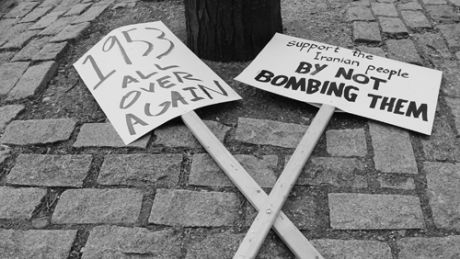Features
You are here
How do we support resistance in Iran?

April 5, 2012
While the drums of war against Iran are beating louder than ever and the punitive measures passed over its so-called “nuclear ambitions” are hurting and paralyzing ordinary Iranians, the image of imperialism as a savior grows fainter than ever.
The old notion of the “enemy of my enemy is my friend” is a myth that almost no one in Iran believes in any more. The exhausted rhetoric used by arrogant and ignorant imperialists has no effect on a nation that is deeply suspicious of foreign interference.
Almost six decades ago, the overthrow of Prime Minister Mossadeq shattered the dream of a nation in freeing itself from the chains of Anglo-Iranian oil companies and a US-backed Shah. It took Iranians thirty long years of persisting struggle to finally achieve the goal of overthrowing Shah.
The pro-democracy movement in Iran has a long history and it is no secret that Iranians are still struggling at home to achieve what they have longed for for almost a century. However, since 1979, before the victory was fully realized by the people, the Islamic clergy that stood by the people against the Shah imposed its control and demobilized the revolutionary movement.
Ever since, the struggle continues against the brutal repression of this regime and the people’s resistance becomes more forceful and targeted by time. The uprising of millions against the fraudulent election of 2009 was a milestone that was never fully contained regardless of the violent measures imposed by the regime.
Considering the grim situation in Iran, one might conclude that Iranians, in their desperation, may welcome foreign intervention to free them from domestic despotism. But anyone with the basic knowledge about the Middle East and its nations will know that this is not the case.
Imperialism’s hostility towards Iran has nothing to do with the anti-democratic nature of its regime, as it is evident in its support for its close allies like Saudi Arabia. Also, its “cry wolf” propaganda against Iran’s nuclear ambition only reminds us about the treacherous lies about non-existent “weapons of mass destruction” in Iraq.
At the end, even if there is any doubt about the true intentions of those drum beaters, we have the examples of Palestine, Afghanistan and Iraq, to name just a few, in front of us.
No to sanctions, to no war
Supporting the Iranian people’s struggle against the repression of their government requires an immediate end to all sanctions. The aims of these sanctions are exactly as they were in Iraq, from 1990 to the start of US-led war in 2003: to weaken the nation for invasion.
A recent Gallup survey indicates that almost half of the nation had difficulty providing food for their families in the past year, with the new surge of sanctions. Yet, these punitive measures are creating an unexpected result. While Iranian people are pressed between the brutality of their own regime and the hardship imposed on them by the western leaders, they see the true objectives of the sanctions and intentions of the foreign forces behind them.
Iranians, like any other nation, are entitled to their sovereignty and rights of self-determination. Their desire to remove a brutal dictatorship is understandable but they have to consent on the replacement as well.
For a nation that has long been deprived of the basic rights of freedom of expression and the opportunity of engagement on the political and social matters it takes time to connect, start the discussion, learn to include and compromise and make an inclusive decision about a future when all groups and individuals, regardless of their specifics are counted and included. This is as much a cultural process as it is political but nevertheless inevitable. If we don’t want to go back inside the next regime’s prisons, labeled as anti-revolutionaries, we have no choice but to go through this process and do it fast.
In the best-case scenario, a surgical removal of regime only creates a void that invites greedy opportunists if an Iranian Karzai has not already filled the vacancy.
Section:
- Log in to post comments










